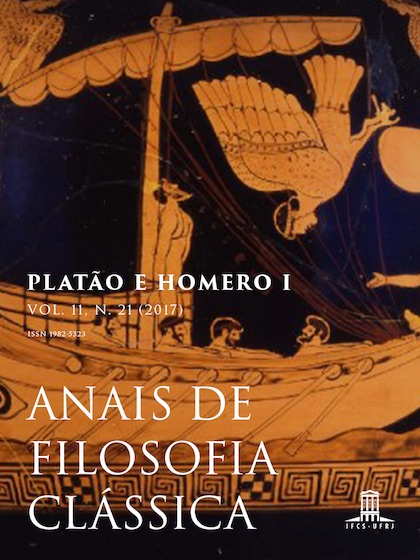Odisseo e Achille nell’Ippia Minore: Esempi di un dibattito morale
DOI:
https://doi.org/10.47661/afcl.v11i21.21665Keywords:
Hippias Minor, Voluntary Evil, Odysseus, Achilles, HomerAbstract
In Hippias Minor, especially in its last part, Plato seems going to argue that those who are able to make a mistake voluntarily (for example, lying) are better, on a moral level, than those who can not do it; and therefore, contrary to the almost unanimously opinion shared in Greek culture, which the subtle and often misleading cunning of Odysseus is superior, from a moral point of view, to the simple sincerity of Achilles. Most of the critics found embarrassing to admit that Plato supported such a thesis, and therefore tried in various ways to take cover. The most used strategy is the following: since the principle according that the one who errs voluntarily is better is valid only in relation to the techniques, Plato would be trying to prove either that ethics is not a technique, or that for this technique which is the ethics the principle in question is not valid. But this is an unsustainable point of view, because it is contrary to both the letter and the meaning of the text. In the Hippias minor, as well as many other dialogues (not just youth), what Plato wants to demonstrate, in clear polemic against the traditional ethics rooted in the ethical model called epic - Homer (that, in fact, in which the moral superiority of Achilles on Odysseus was established), is that from a formal point of view ethics (and more generally philosophy, considering the practical intent that it has in Plato) is a technique exactly like the others: it is the technique, in particular, which has as purpose the production of happiness, or the good life (after all this is already implicit in the Socratic motto according to which virtue is knowledge). And since it is unthinkable a technique in which the expert does not have enough knowledge to make mistakes, it necessarily follows that the offending principle is also valid for ethics and philosophy: those who are able to do evil voluntarily are better than those who can not do it. Naturally, if from here we derive the consequence that the virtuous does both evil and good voluntarily, while the vicious, not being able to do evil, does voluntarily only good, we would have reached an absurd conclusion. But in reality the sentence in question is doubly false. In the first place the vicious does not do good voluntarily: in fact the reason why he can not do evil voluntarily is that he does not know the difference between good and evil, and therefore for the same reason he can not voluntarily do good. In the second place, the virtuous does not do evil voluntarily, simply because evil never does it. And here is what is the only real difference between other techniques and ethics/philosophy. A technician can voluntarily make mistakes because he can, if necessary, operate for purposes other than those of his technique (for example, a doctor may want to kill a patient), which at the moment considers more important; instead the philosopher, that is the technician of the ethics, does not have this possibility, because the goal of the ethics is the realization of the good life, and goals that can be considered superior to this if they do not exist.Downloads
Download data is not yet available.
Downloads
Published
2018-11-17
Issue
Section
Artigos


